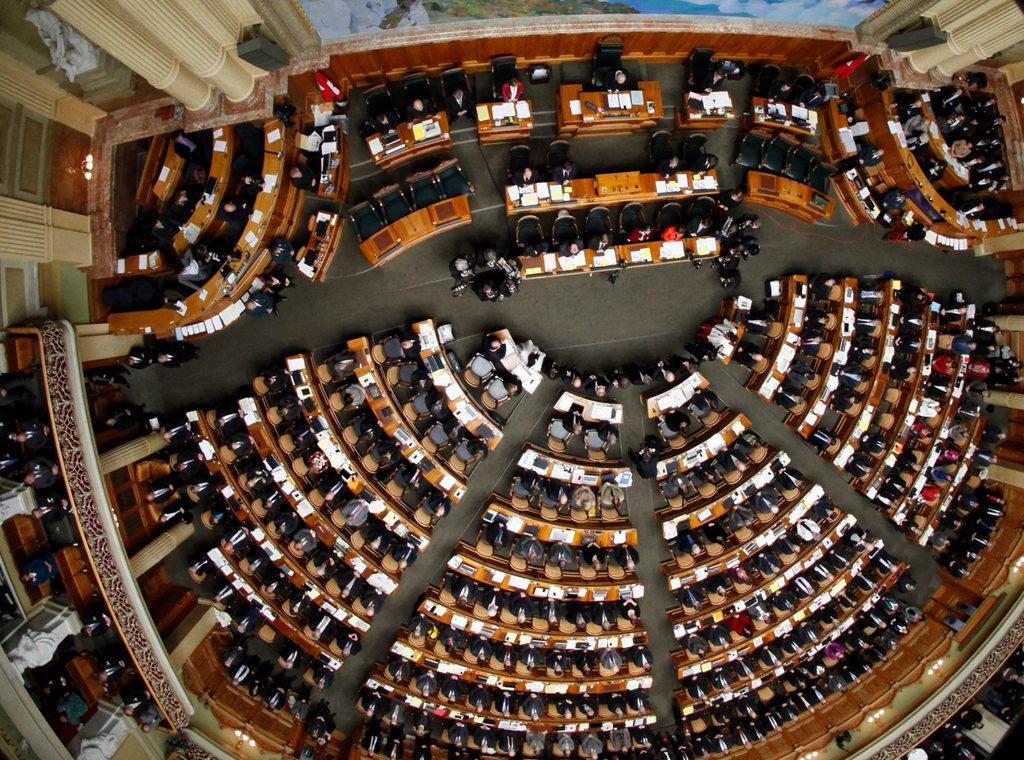Vaud corporate tax vote sends signal to Bern

Sunday’s landslide vote in canton Vaud for ‘creative’ corporate tax reforms sends an important signal to Bern, Swiss newspapers agree. But they doubt that parliament will adopt such a conciliatory position on this controversial issue.
On Sunday, Vaud citizens overwhelmingly backed (87%) a reform of the overall corporate tax rate in the canton – setting a single lower rate of 13.79% from 2019 onwards, compared to 21.65% at present.
The plan involves not only slashing the cantonal corporate tax rate and eliminating special statuses for foreign companies, but also social measures – additional funds for family allowances and setting a threshold for compulsory health insurance (maximum 10% of income). In general, foreign firms with special status are expected to pay more tax, while most small and medium-sized firms will pay less.
The idea, designed to clarify and stabilize the business and investment situation in Vaud while strengthening certain social aspects, had received wide political support, with opposition only from a leftwing group and the public services union.
The regional French-speaking paper 24Heures described the result as a “small lesson in democracy for all Swiss”.
This ‘creative solution’ to a complex technical issue involved a ‘remarkable effort of political schooling to show the link between economic competitiveness and social progress,” it wrote.
The Agefi business newspaper said the reform sent an important signal to Bern: “There is a feeling that a new egalitarian regime between Swiss and foreign firms is globally acceptable politically.”
Unfair competition
For several years, Switzerland has been under pressure from the Organisation for Economic Cooperation and Development (OECD) and the European Union, which wish to put an end to unfair competition that benefits foreign businesses with special status in the small alpine nation. In 2014, Bern agreed to end certain company tax measures regarded as ‘harmful’ as part of its reform of corporate tax rules.
At the cantonal level, Brussels criticized Switzerland’s tax perks for holdings, as well as domicile and mixed companies. At the federal level it has been critical of Swiss-based headquarters and branches of multinationals as well as companies active as “Swiss finance branches”.
In particular, the EU has been demanding that cantons remove “discriminatory” tax breaks on the overseas earnings of foreign firms and apply the same rate as domestic profits.
Vaud, the headquarters of numerous multinationals, is the first canton to have pushed ahead with regional reforms, despite the issue still being discussed at federal level in Bern as part of the so-called “tax reform III agenda”.
Since tax changes could potentially cause multinationals to find Switzerland a less attractive business location, parliament is focusing on developing a system of tax breaks that will benefit all businesses.
This could include the introduction of several instruments, including a system of tax breaks for research and innovation (royalty boxes). Cantons could also be able to deduct expenses incurred for research and development, introduce targeted relief from capital taxation, and lower the tax rates on businesses’ benefits, which vary from one region to another.
Federal battle
24Heures said tensions surrounding the ongoing debate in parliament did not augur well for a ‘conciliatory approach’.
“The right seems tempted to load the federal reform of companies with tax optimization instruments for multinationals without giving the same importance to balancing elements,” it wrote.
The leftwing paper Le Courrier said it was concerned the Vaud result risks “giving the business circles and their lobbies in parliament a real boost.”
The Le Temps newspaper said the impact of the Vaud vote on events in Bern should not be overestimated, however: “An increasingly tough right-left tussle is taking place at federal level. The two camps will probably try to resolve things in a nationwide vote.”
The battle over the corporate tax reforms is being closely watched inside and outside Switzerland. The average corporate tax rate among the 26 cantons was 17.9% in 2015, compared with 21.2% in 2006. Switzerland is still placed favourably in international comparisons, but tax rates vary significantly between cantons. In 2015, Lucerne stood at 12.32% and Zug at 14.6%. Geneva is still considering whether to slash its rate to 13%.

In compliance with the JTI standards
More: SWI swissinfo.ch certified by the Journalism Trust Initiative













You can find an overview of ongoing debates with our journalists here . Please join us!
If you want to start a conversation about a topic raised in this article or want to report factual errors, email us at english@swissinfo.ch.